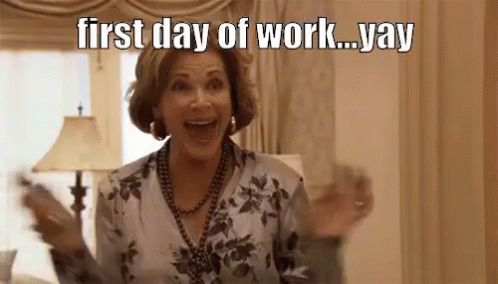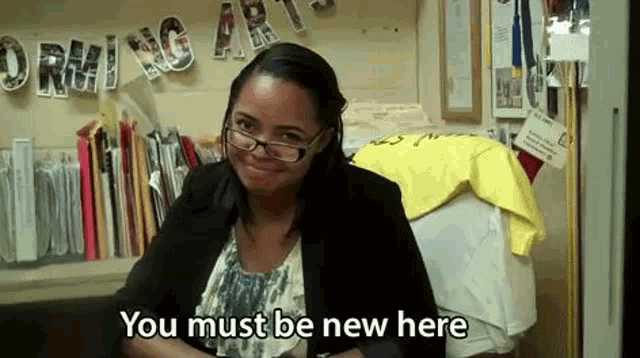Today I will try to cover this topic I am avoiding for over a month. Mainly because it seems long and tedious to write. It’s an answer to a question that almost everyone faces at some point in their career: “How was your first day at work?”
Whether you’re fresh out of college or starting a new chapter in your professional life, this seemingly simple question can be surprisingly tricky to answer.
As someone who’s been through this more times than I’d like to admit, I’ve compiled a comprehensive list of responses for various scenarios depending on whom you are talking.
Remember, the key is to gauge your audience and the situation before choosing your answer.

When your boss asks
When talking to your boss, it’s best to keep things professional, positive, and focused on the job. Be sincere, but avoid oversharing or complaining about minor issues.
1. “It was very informative, thank you for the warm welcome.”
Explanation: This shows appreciation and positivity without oversharing.
2. “I’m excited about the projects you mentioned and look forward to contributing.”
Explanation: Demonstrates enthusiasm and readiness to work.
3. “The team has been incredibly helpful in getting me oriented.”
Explanation: Acknowledges the support system and team spirit.
4. “I’ve already learned so much and can’t wait to dive deeper.”
Explanation: Shows eagerness to learn and grow in the role.
5. “It was a great introduction to the company culture and my responsibilities.”
Explanation: Indicates that you’re paying attention to both work and workplace dynamics.
6. “I appreciate the comprehensive onboarding process.”
Explanation: Compliments the company’s organization and preparation.
7. “I’m looking forward to applying my skills to the upcoming projects.”
Explanation: Shows initiative and readiness to contribute.
8. “It was challenging but in a good way – I’m excited about the learning curve ahead.”
Explanation: Demonstrates a positive attitude towards challenges.
9. “I’m impressed with the team’s efficiency and looking forward to matching that pace.”
Explanation: Shows observation skills and willingness to adapt.
10. “It was a productive day, and I’m eager to build on this strong start.”
Explanation: Conveys positivity and commitment to continuous improvement.
When a new coworker asks
With coworkers, you can be a bit more casual and open. It’s a good opportunity to start building relationships, but still be mindful not to overshare or complain.
1. “It was good! Still trying to remember everyone’s names though.”
Explanation: Honest and relatable, often sparking a friendly conversation.
2. “Pretty smooth, thanks for asking. How was your first day here?”
Explanation: Shows interest in building a rapport with colleagues.
3. “Busy but exciting. I’m looking forward to working with everyone.”
Explanation: Expresses enthusiasm without going into too much detail.
4. “It was great! Any tips for a newbie?”
Explanation: Opens the door for advice and shows willingness to learn.
5. “So far, so good. Still figuring out where everything is though!”
Explanation: Lighthearted and honest, often eliciting helpful responses.
6. “Interesting! There’s a lot to take in, but everyone’s been super helpful.”
Explanation: Acknowledges the learning curve while appreciating the team.
7. “It flew by! Before I knew it, it was time to go home.”
Explanation: Implies engagement and a positive experience.
8. “Pretty good. I’m curious to see what a typical day looks like once I’m settled in.”
Explanation: Shows forward-thinking and interest in the daily routine.
9. “Not bad at all. Hey, where’s the best place to grab lunch around here?”
Explanation: Casual and friendly, inviting further interaction.
10. “It was fine, thanks. How long have you been with the company?”
Explanation: Shifts the focus to the coworker, showing interest in their experience.
When your parents ask
With parents, it’s often best to be positive and reassuring. They want to know you’re happy and doing well, so focus on the positives even if there were some challenges.
1. “It went well! The office is really nice.”
Explanation: Provides a positive, tangible detail that parents can relate to.
2. “Good, but I’m exhausted. There’s so much to learn!”
Explanation: Honest about the challenges while staying positive.
3. “Everyone seems friendly. I think I’m going to like it there.”
Explanation: Reassures parents about the social aspect of the new job.
4. “It was great! I already have my first project assigned.”
Explanation: Shows that you’re being productive and valued.
5. “Pretty good. The commute wasn’t as bad as I expected.”
Explanation: Addresses practical concerns parents might have.
6. “Exciting! I can’t wait to tell you more about it this weekend.”
Explanation: Positive but defers detailed discussion for later.
7. “It was fine. How was your day?”
Explanation: Briefly acknowledges the question before shifting focus.
8. “Better than I expected. I think this was a good career move.”
Explanation: Reassures parents about your decision.
9. “Busy! I’ll need to get used to the early mornings though.”
Explanation: Honest about adjustments while implying overall satisfaction.
10. “It was good. Thanks for all your support in getting me here.”
Explanation: Shows gratitude and acknowledges their role in your success.
When your partner asks
With your partner, you can be more open about both positives and negatives. They’re often your closest support system, so honesty is usually the best policy.
1. “It was good, but I’m so glad to be home with you now.”
Explanation: Positive about work while emphasizing the importance of personal life.
2. “Interesting! Want to hear about it over dinner?”
Explanation: Suggests sharing more details in a relaxed setting.
3. “Pretty intense. I might need extra cuddles tonight.”
Explanation: Honest about the challenges while inviting support.
4. “It went well. How about we celebrate with a movie night?”
Explanation: Positive but shifts focus to quality time together.
5. “Good, but a bit overwhelming. What was your day like?”
Explanation: Shares briefly but shows interest in your partner’s day too.
6. “Not bad! I think I’m going to enjoy this new challenge.”
Explanation: Expresses optimism and personal growth.
7. “It was fine. I’m more interested in hearing about your day, though.”
Explanation: Acknowledges the question but prioritizes your partner.
8. “Better than expected. Thanks for being so supportive through this transition.”
Explanation: Shows appreciation for your partner’s role in your career.
9. “Exciting but tiring. How about a relaxing evening in?”
Explanation: Honest about the impact while suggesting shared downtime.
10. “It was good. I’m looking forward to sharing more details, but first, how are you doing?”
Explanation: Shows willingness to talk while ensuring balanced communication.

Sarcastic replies (for really bad first days):
Remember, while these sarcastic replies can be funny among close friends, they’re best avoided with professional contacts or anyone who might take them seriously.
1. “Fantastic. I’ve already got my ‘Employee of the Month’ speech ready.”
Explanation: Humorously implies the opposite of a great day.
2. “Well, I didn’t quit, so there’s that.”
Explanation: Sarcastically sets a very low bar for success.
3. “Let’s just say I’m really looking forward to retirement.”
Explanation: Jokingly suggests long-term dissatisfaction.
4. “It was so great, I can’t wait for my alarm to go off tomorrow.”
Explanation: Uses sarcasm to imply dread for the next workday.
5. “Wonderful. I’ve found my life’s calling in data entry.”
Explanation: Sarcastically implies a mundane or unfulfilling role.
6. “Absolutely thrilling. I’ve named all the ceiling tiles.”
Explanation: Humorously suggests extreme boredom.
7. “Living the dream, one paperclip at a time.”
Explanation: Sarcastically downplays the excitement or importance of the job.
8. “I’m just counting down the days until my next vacation.”
Explanation: Implies dissatisfaction through exaggerated focus on time off.
9. “It was great! I only cried in the bathroom twice.”
Explanation: Uses dark humor to suggest a difficult day.
10. “Let’s just say I’m updating my resume as we speak.”
Explanation: Sarcastically implies looking for a new job already.
Conclusion
The “first day at work” conversation can be tricky, but with these responses in your toolkit, you’ll be prepared for any situation. Remember, the key is to read your audience and the context.
With bosses and new coworkers, err on the side of positivity and professionalism. With family and close friends, you can be more open and honest. And those sarcastic replies? Use with caution and only with those who appreciate your sense of humor!
Remember, every new job has its adjustment period. A rough first day doesn’t necessarily predict the entire experience. Stay positive, be patient with yourself, and give it time.



